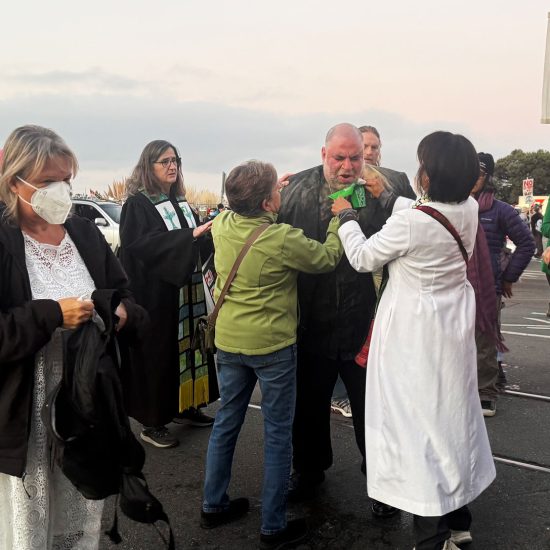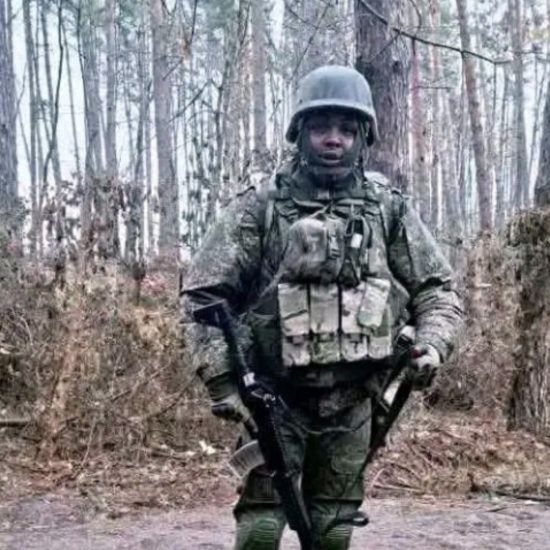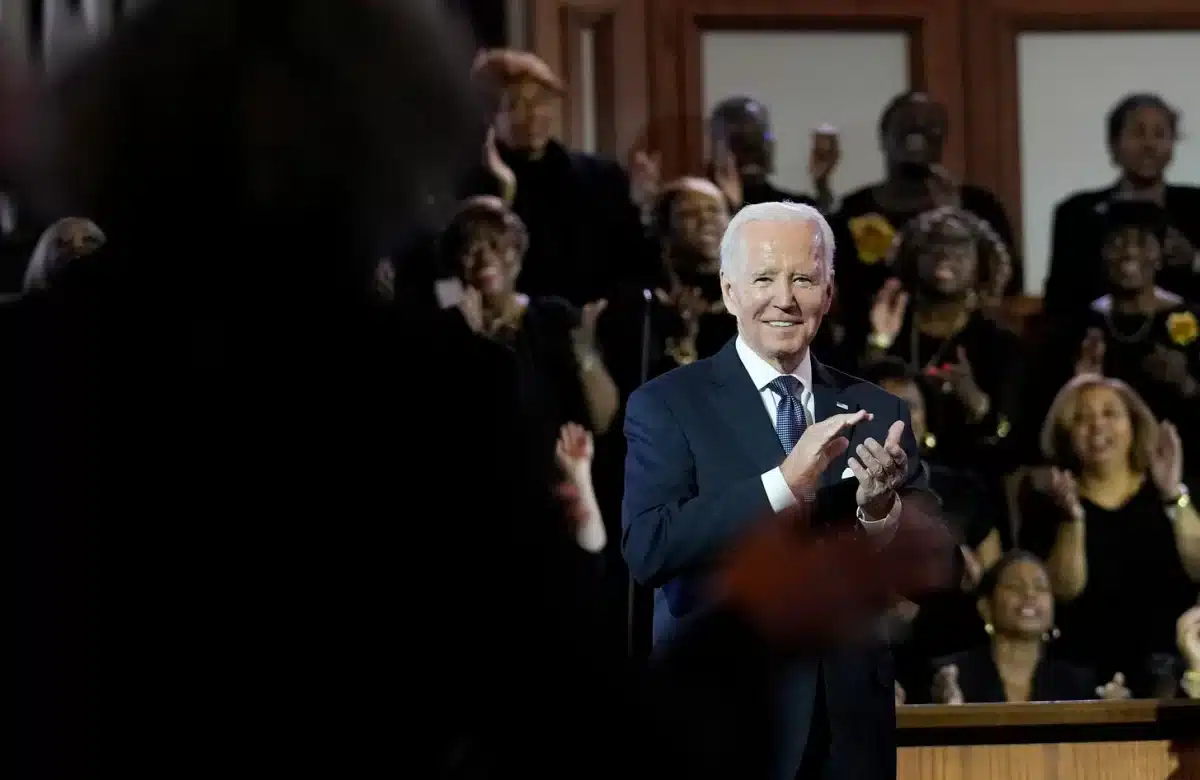
(RNS) — With President Joe Biden sitting over his right shoulder, Bishop J. Louis Felton made it clear as he stood in his Philadelphia pulpit how he felt about the continuing candidacy of his guest.

President Joe Biden claps at Ebenezer Baptist Church in Atlanta, Georgia, on Jan. 15, 2023, during a service honoring Martin Luther King Jr. (Carolyn Kaster/Associated Press)
“If we ever lock arms and come together, there’s no election that we cannot win,
there’s no enemy that we cannot defeat,” said the senior pastor of Mount Airy Church of God in Christ at a campaign event on Sunday (July 7). “We are together because we love our president,” Felton said, as his congregants cheered in agreement.
“We are together because we love our president. We pray for our president. We ask that you continue to give him strength. He’s an Eagles fan. Renew his youth like the eagles. Let him mount up with wings as eagles, run and not be weary, walk and not faint.”
Just before Felton’s prayerful affirmation, a gospel choir had sung a song with lyrics that included the words “You are important to me. I need you to survive.”
In the wake of Biden’s widely panned debate performance Biden against former President Donald Trump, there is strong support as well as a plethora of questions from a wide array of Americans, including those in the country’s Black churches, long considered a significant part of Biden’s base.
At Mount Airy, when Biden concluded his seven-minute remarks in which he praised the power of the faith of Black churches “in good times and in tough times” — members of the church chanted “four more years.”
On the other hand, another Church of God in Christ minister, the Rev. Karl Anderson of Gainesville, Florida, said he’s hearing no-voting threats and “serious” fear — despite the biblical command against it — from the barbershop to the texts that interrupted his attendance at an international COGIC convention in St. Louis on the night of the debate.
“I’m getting text messages from people back home, saying, ‘Pastor, what are we going to do? it’s not looking good,’” Anderson recalled. “I’m getting text messages from family members: ‘Cuz, it’s not looking good. I don’t know what we’re going to do. Man, we got to pray.’”

“Most White Christian voters would vote for Trump if the election were held today; most religious ‘nones’ and Black Protestants would back Biden” (Graphic courtesy Pew Research Center)
A Thursday report from Pew Research Center shows that registered voters said if they only had Biden and Trump as candidate choices, 50% would side with the former president, compared with 47% with the incumbent. Trump has greater support among white voters (50% to 36%) while Biden has the greater share of Black voters (64% to 13%, with 21% supporting third-party candidate Robert F. Kennedy Jr.).
While Protestants overall favor Trump (55% to 29%, with 15% supporting Kennedy), Black Protestants favor Biden (65% to 11%, with 22% supporting Kennedy).
The survey, taken July 1-7, follows an April 8-14 survey that did not include questions about Kennedy. The earlier survey found 48% of registered voters favoring Biden and 49% for Trump. Protestants overall favored Trump (60% to 38%), while Black Protestants gave Biden more support (77% to 18%).
The numbers show, before and after the debate, that there is not monolithic Black church support for Biden.
“Statistically, Black nondenominational Protestants are far more likely to vote for Republicans than are Black Methodists, Black Baptists and Black Holiness Pentecostals,” the latter group including the Church of God in Christ, noted Jason Shelton, author of the forthcoming book “The Contemporary Black Church: The New Dynamics of African American Religion.”
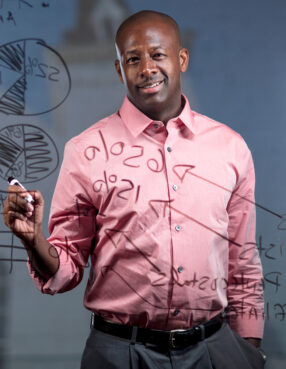
Jason Shelton. (Photo by Justin Clemons)
Shelton, director of the Center for African American Studies at the University of Texas at Arlington, said “a good number” of nondenominational Black Protestants were receptive to Trump before and after the debate.
“However,” he added, “a lot of African Americans are up in the air with President Biden post debate.”
He said prominent July appearances at national conventions that include Black churchgoers — such as Vice President Kamala Harris’ speech Wednesday to the meeting of her sorority, Alpha Kappa Alpha, and Biden’s expected address to the NAACP on July 16 — could help shore up support for the president.
R. Khari Brown, a sociologist at Wayne State University, said that on the local level, he expects Black churches will continue to focus on domestic issues — such as jobs and criminal justice — that affect the votes of their members. Though churches generally don’t campaign for politicians, he said Democratic supporters of Biden could hold forums in churches to describe domestic policies that his administration has enacted that have helped African Americans.
“There needs to be a link between ‘You should vote for us’” and policy successes such as the Affordable Care Act, said Brown, co-author of “Race and the Power of Sermons on American Politics.”
Or tell voters that “we’ll ensure the EPA has enough resources to go after companies that are disproportionately polluting the air and the water in African American communities,” he suggested.
Representatives of some groups related to historic Black denominations resonate with Biden on both the policy level and the personal level.
Jacquelyn Dupont-Walker, director of the African Methodist Episcopal Church’s Social Action Commission, said the debate stage is not the only focus for many Black churchgoers.
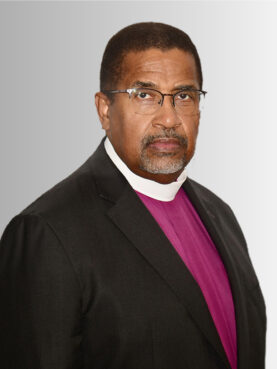
Bishop Lawrence Reddick. (Courtesy photo)
“We understand that our freedom is at risk, and so one appearance is not something that we are alarmed about,” she said. “We are not running out to say, ‘Oh my God, look at Biden.’ The other man is how many years younger? I mean, he’s not that much younger, but we do know how he feels about the freedom and movement that we have spent our lives trying to ensure becomes a part of the American promise. America’s promise to us would not be kept by that other man.”
Bishop Lawrence Reddick, the senior leader of the Christian Methodist Episcopal Church, said he’s heard much disappointment among Biden supporters in Black church circles about his performance in the late June debate. But the bishop said it reminded him of his own recent experience.
“I identified with him during the debate because just a month ago, I went to one of our churches in Michigan to speak, and I didn’t get enough rest beforehand,” said Reddick, who supervises CME churches in Texas and Jamaica.
His wife had to pass him her phone so he could see that he had been speaking for too long.
“Things happen when you’re really worn out,” said Reddick, 72. “And when I saw Biden walk on the stage, I said, they worked him too hard. He needed rest. So for me, it is one failed night in many respects, but not in all respects.”
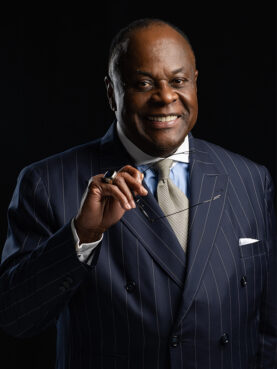
The Rev. W. Franklyn Richardson. (Courtesy photo)
Reddick and the Rev. W. Franklyn Richardson, chairman of the Conference of National Black Churches, said they don’t think the Hamas-Israel war and their concerns about its effect on the people of Gaza will be a decisive factor in considerations of Biden despite the fact that leaders of several Black denominations and grassroots Black Christians have urged for months that there be a cease-fire or other action to end the conflict.
“I don’t think it’s going to direct the overall outcome of the vote,” said Richardson, who listed contrasts on other priorities between Biden and Trump.
“I think overwhelmingly, the Black community is still aligned with — the Black church, particularly — with President Biden, and it’s on two different bases,” he said. “One is that the African American community recognizes the accomplishments that President Biden has made during his time as president. He made promises to us, and in many ways, those promises have been kept.”
Richardson cited increased access to health care, historic low levels of Black unemployment, and Biden’s nomination of Ketanji Brown Jackson as the first Black woman Supreme Court justice.
“Secondly, where are you going to run to?” he added. “Overwhelmingly, African Americans in our churches don’t support Donald Trump’s style, content or actions,” including “abrasive” ways and comments that are “demeaning to people of color” and social justice positions that “counter our pursuit of our legacy and our heritage.”
Richardson was among the leaders invited to participate in a prayer call Wednesday night in the wake of the debate with an organization focused on voter mobilization and protection.
The Rev. Barbara Williams-Skinner, a core leader of Faiths United to Save Democracy, said her organization hosted “an urgent call to prayer for our troubled and divided nation” that featured Black church leaders and a diverse range of officials of national groups.
But Richardson added he thinks Biden should be praying too — about his next steps.
“President Biden ought to take seriously the possibility that he’s having some failure, that he needs to not just have the Lord come in and speak to him,” Richardson said, referring to a comment the president made in an ABC interview. “But he needs to pray and ask the Lord to help him find his way, and then have the courage to act in faith, to do whatever’s best for the interest of the country.”

